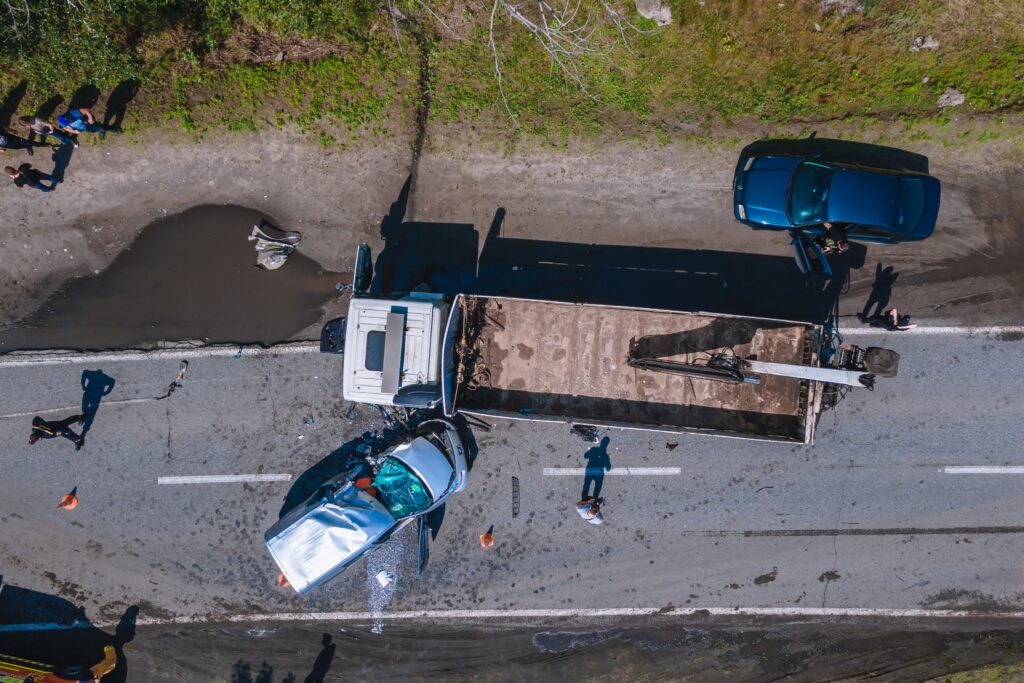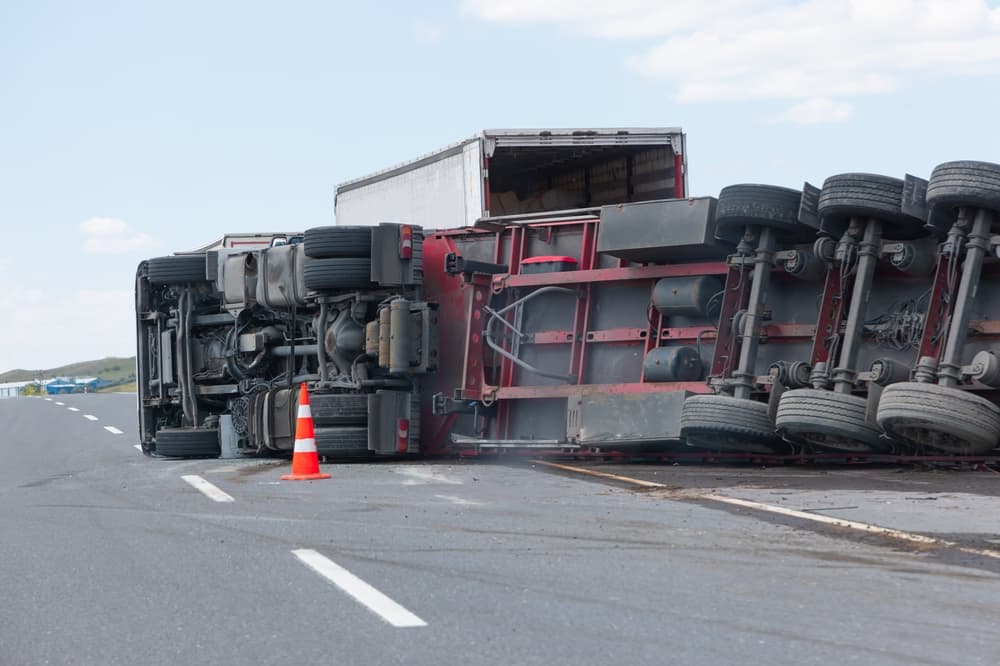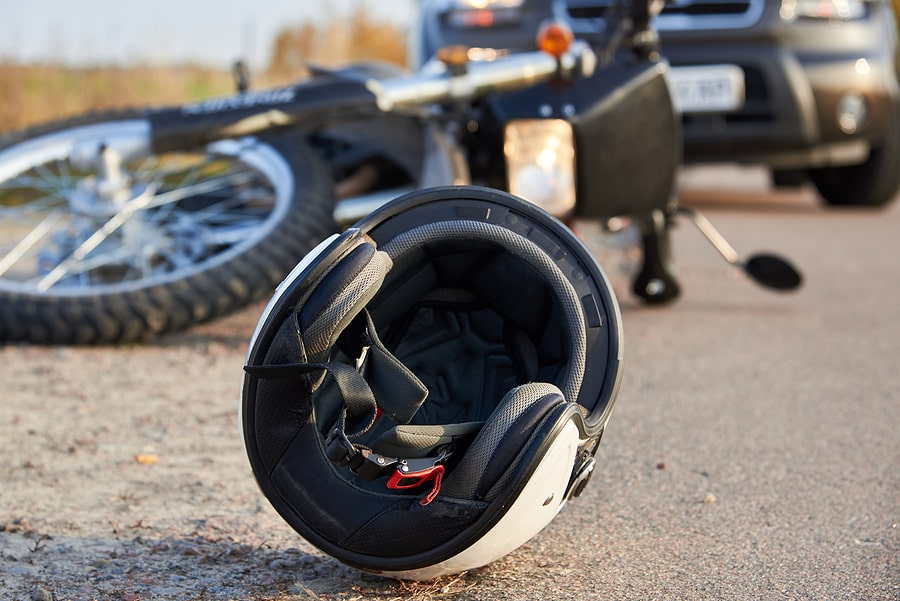A trucking company may be liable for a truck accident when its negligence directly contributes to the crash. This liability can arise in several ways, such as hiring unqualified drivers, failing to provide proper training, ignoring federal safety regulations, or neglecting regular vehicle maintenance.
You can also hold companies responsible if they pressure drivers to work long hours, falsify logs, or encourage unsafe practices that put profits above safety. In these situations, the driver and the company can share responsibility for the damages.
The skilled truck accident lawyers at Emroch & Kilduff can carefully investigate the cause of your crash and identify all liable parties. They will gather critical evidence to build a strong case, including driver records, maintenance reports, black box data, and employment files.
By negotiating with insurance companies or presenting evidence in court, our attorneys work to secure fair compensation for medical expenses, lost income, and pain and suffering.
For a free legal consultation and case evaluation, please give us a call or contact us online right away.
Key Takeaways: Trucking Company Liability for an Accident
• Trucking companies can be held liable when their negligence contributes to a crash. It may include hiring unqualified drivers, failing to provide proper training, or ignoring federal safety regulations designed to protect the public.
• Neglected maintenance creates serious risks. If a company skips inspections or ignores needed repairs, defective brakes, worn tires, or other unsafe conditions can directly cause an accident.
• Pressure on drivers can lead to unsafe behavior. Forcing unrealistic delivery schedules or encouraging drivers to work beyond legal limits often results in fatigue, distraction, or reckless driving.
• Both drivers and companies may share liability. Even if a driver acted carelessly, the trucking company can also be responsible for creating or allowing unsafe conditions.
• A skilled truck accident lawyer is essential. An attorney can gather driver logs, black box data, maintenance reports, and company records to prove negligence.
• Lawyers protect victims’ rights. They negotiate with insurance companies and, if necessary, take the case to court to pursue full compensation for medical bills, lost income, and pain and suffering.
How Do Negligent Truck Drivers Cause Accidents?

Truck accidents often lead to devastating consequences, many of which result from negligent actions by truck drivers. Because of the sheer size and weight of commercial trucks, even a small mistake can cause serious injuries or fatalities. Some of the most common ways negligent truck drivers cause accidents involve distracted driving, fatigue, speeding, improper lane changes, and substance abuse.
- Distracted driving is one of the leading causes of truck accidents. Truck drivers spend long hours on the road, which can make them more likely to look at their phones, adjust navigation systems, or eat while driving. Even a few seconds of distraction can be enough for a truck to drift into another lane or fail to stop in time, putting nearby drivers at risk.
- Driver fatigue is another widespread issue. Federal regulations limit how many hours truck drivers can operate without rest, but these rules are not always followed. Exhaustion slows reaction times and impairs judgment, similar to alcohol impairment. Fatigued truck drivers may nod off behind the wheel or miss crucial traffic signals.
- Speeding and aggressive driving also play a major role in truck accidents. Because large trucks require much more distance to stop, exceeding the speed limit or tailgating smaller vehicles is especially dangerous. An aggressive lane change or sudden braking maneuver can easily trigger a multi-vehicle collision.
- Improper lane changes and failure to check blind spots are additional hazards. Trucks have large blind spots on all sides, and when drivers fail to properly signal or check their mirrors, they may collide with cars they did not see.
- Finally, some accidents stem from substance abuse. Although most trucking companies have strict testing policies, some drivers still use alcohol or drugs. These substances severely impair coordination and decision-making, increasing the risk of catastrophic accidents.
How Do Negligent Trucking Companies Cause Accidents?
When trucking companies take shortcuts, they can also contribute to serious collisions:
Inadequate Hiring Practices
Trucking companies have a duty to hire qualified, safe drivers. However, some companies cut corners by failing to check a driver’s background thoroughly. When companies overlook past driving violations, criminal records, or a lack of proper licensing, they put unqualified drivers behind the wheel. A driver without the necessary training or experience may struggle to control a large truck, greatly increasing the risk of an accident.
Poor Training Programs
Even when drivers are properly licensed, trucking companies must provide ongoing training. Many accidents occur because companies fail to teach drivers about defensive driving techniques, handling hazardous weather, or operating specialized equipment. Without this training, drivers may not know how to react in emergency situations, leading to collisions that could have been prevented.
Forcing Unrealistic Schedules
Another common form of negligence involves pushing drivers to meet strict or unrealistic delivery deadlines. Some trucking companies pressure their employees to drive longer hours than federal regulations allow, which contributes to driver fatigue. Fatigued drivers are likelier to fall asleep, miss traffic signals, or react too slowly to road conditions.
Neglecting Vehicle Maintenance
Commercial trucks must be regularly inspected and maintained, but not all companies take this responsibility seriously. Faulty brakes, worn tires, broken lights, and steering problems are all preventable issues that can cause accidents. When a company neglects maintenance to save time or money, it endangers everyone on the road.
Encouraging Unsafe Practices
Finally, trucking companies sometimes encourage unsafe behaviors, either directly or indirectly. For example, they may reward drivers for faster deliveries, which can lead to speeding or aggressive driving. Some companies fail to enforce rules against distracted driving or substance use, creating an environment where unsafe conduct is overlooked.
Most Common Injuries in Commercial Trucking Accidents

Truck accidents are among the most dangerous types of collisions on the road. Because of the massive size and weight of commercial trucks, victims often suffer far more severe injuries than those seen in ordinary car accidents. These truck accident injuries can be life-altering, requiring extensive medical treatment and long-term care. Some of the most common injuries victims of trucking accidents suffer include traumatic brain injuries, spinal cord damage, broken bones, internal injuries, and emotional trauma.
Traumatic Brain Injuries
Head injuries are common in truck accidents due to the violent impact. Victims may strike their head against the steering wheel, dashboard, or window. Traumatic brain injuries (TBIs) range from concussions to permanent brain damage, often leading to memory loss, cognitive problems, and difficulty performing daily tasks.
Spinal Cord and Back Injuries
The force of a truck collision can cause severe trauma to the back and spine. Victims may experience herniated discs, fractured vertebrae, or even complete spinal cord injuries that result in partial or full paralysis. These injuries often require surgery, rehabilitation, and lifelong adjustments.
Broken Bones and Fractures
Broken arms, legs, ribs, and hips are common when smaller vehicles are crushed or thrown during impact. Multiple fractures may occur at once, leaving victims in casts, undergoing surgery, or facing a long and painful recovery period.
Internal Injuries
Internal bleeding and organ damage are also frequent in trucking accidents. The violent force can rupture organs such as the lungs, liver, or spleen. These injuries are particularly dangerous because they may not be immediately visible but can quickly become life-threatening without urgent medical treatment.
Emotional Trauma
Beyond physical injuries, many victims experience psychological harm. Post-traumatic stress disorder (PTSD), anxiety, and depression often follow such devastating crashes. Emotional recovery can be just as challenging as healing from physical wounds.
Proving Negligence in a Truck Accident Claim
Negligence occurs when a driver or company fails to act with reasonable care, and their actions or inactions directly cause harm. To build a strong case, victims and their lawyers must establish that the driver or company owed a duty of care, breached that duty, and that the breach caused the accident and resulting damages.
This process often relies on evidence, including:
- Driver Records and Logs – Federal regulations limit how many hours a truck driver can be on the road without rest. Reviewing a driver’s logbooks, electronic logging device (ELD) data, or GPS records can reveal if they violated hours-of-service rules. Evidence of fatigue or falsified logs can strongly support a negligence claim.
- Maintenance and Inspection Reports – Trucking companies are required to inspect and maintain their vehicles. Records showing skipped inspections, ignored repairs, or faulty parts may demonstrate company negligence. A brake failure or tire blowout caused by poor maintenance can establish liability.
- Black Box Data and Dash Cameras – Most commercial trucks are equipped with electronic control modules, often referred to as “black boxes.” These devices record information such as speed, braking patterns, and sudden maneuvers before a crash. Dash camera footage, if available, can also reveal reckless or distracted driving.
- Witness Statements and Police Reports – Eyewitnesses can provide firsthand accounts of what occurred, while police reports often contain valuable details such as citations issued, officer observations, or diagrams of the crash scene. These documents help to establish how the accident happened.
- Employment and Training Records – If a trucking company hired an unqualified driver or failed to provide proper training, employment files and safety policies can prove negligent hiring or supervision.
Recovering Compensation for Injuries in a Trucking Accident

Victims of truck crashes may be eligible to recover various types of compensation, including:
Medical Expenses
Medical expenses are one of the most significant forms of compensation in a truck accident case. Victims may recover the cost of emergency room care, hospital stays, surgeries, medications, and physical therapy. Compensation can also cover future medical needs, such as ongoing rehabilitation, specialist visits, or long-term nursing care if the injuries are permanent.
Lost Income and Earning Capacity
When injuries prevent victims from returning to work, they may be entitled to recover lost income. It includes income missed during the recovery period and, in severe cases, loss of future earning capacity. If injuries prevent victims from working in the same field or force them into lower-paying employment, compensation may reflect that financial loss.
Pain and Suffering
Beyond financial losses, truck accident victims often experience significant physical pain and emotional distress. Pain and suffering damages address the toll of chronic pain, loss of mobility, scarring, or other life-changing conditions. Emotional consequences such as anxiety, depression, and post-traumatic stress disorder may also be included under this category.
Property Damage
Truck accidents often cause extensive damage to vehicles and personal belongings inside them. Compensation may cover the cost of repairing or replacing a damaged car.
Loss of Enjoyment of Life
Severe injuries may prevent victims from enjoying activities they once loved, whether sports, hobbies, or spending time with family. Compensation for loss of enjoyment of life acknowledges these limitations and the reduced quality of daily living.
FAQs: Trucking Company Liability for an Accident
What does trucking company negligence mean?
Negligence happens when a trucking company fails to act responsibly, leading to unsafe conditions on the road. It can include hiring unqualified drivers, ignoring safety rules, skipping truck maintenance, or pushing drivers to meet unrealistic schedules.
How do trucking companies cause accidents through negligence?
Common causes include poor training, overworked drivers, faulty brakes or tires, and failure to monitor driver behavior. These unsafe practices often lead to serious crashes that could have been prevented.
Can I hold the truck driver and the trucking company responsible?
Yes. If the driver acted carelessly and the company also failed in its duties, both may share liability for the accident.
What evidence can prove a trucking company was negligent?
Maintenance records, driver logs, employment files, and black box data can all be used to show that the company failed to follow safety standards.
How can a skilled truck accident lawyer help?
At Emroch & Kilduff, our experienced lawyers know how to gather evidence, work with experts, and negotiate with insurance companies. We fight to prove negligence and seek full compensation for medical costs, lost income, and pain and suffering.
What is spoliation of evidence in a truck accident case?
Spoliation is the intentional destruction, alteration, or concealment of evidence. Trucking companies may have a motive to destroy evidence after a crash, such as driver logs, black box data, or maintenance records, to avoid liability.
A lawyer can take immediate legal action to prevent a company from destroying this critical evidence.
Why is it important to act quickly after a truck accident?
Critical evidence like black box data and driver logs can be lost or destroyed over time. An experienced attorney can immediately send a spoliation letter to the trucking company to preserve all evidence, including video footage and maintenance records, that could be vital to your case
What types of compensation are available in a truck accident claim?
You may recover compensation for medical bills, lost wages, pain and suffering, and property damage. An attorney can identify all possible sources of financial recovery, including future medical costs and loss of earning capacity.
Are there specific federal regulations that apply to trucking companies?
Yes. The Federal Motor Carrier Safety Administration (FMCSA) sets strict rules for the trucking industry, including hours of service for drivers, vehicle maintenance standards, and required insurance coverage. A violation of these regulations can provide strong evidence of negligence in a lawsuit
How is a truck accident claim different from a car accident claim?
Truck accident cases are often more complex due to the size and weight of the vehicles, the severity of the injuries, and the extensive network of federal regulations that apply. They often involve multiple liable parties, including the driver, the trucking company, the maintenance crew, and the cargo loader, requiring a comprehensive investigation
Speak With a Knowledgeable Truck Accident Lawyer Right Away
The knowledgeable truck accident attorneys at Emroch & Kilduff can help if you suffered injuries in a recent truck collision. We will promptly investigate your accident case, gather the evidence to prove truck driver or trucking company liability, and pursue the financial compensation you need.
For a free case evaluation and legal consultation, please call (804) 358-1568 or contact us online today for more information.


